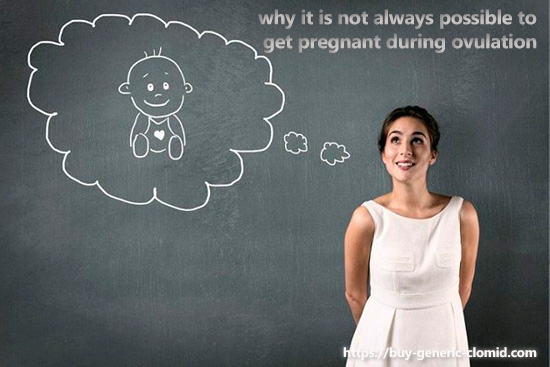When a couple starts planning to conceive a baby, the first few unsuccessful attempts can cause a lot of questions — why pregnancy does not occur, because partners try to conduct sexual acts during this, the most favorable fertile female period. In fact, this is a normal situation, the reasons for which may be quite natural. But also pathological prerequisites are not excluded.
General information
Ovulation is a short period of the female menstrual cycle when a Mature egg comes out of the dominant follicle into the fallopian tube. A set of germ cells in an immature state in girls is available even when the baby is in the womb. Then, during life, part of the first — order oocytes die, and part is spent on ensuring the cyclical work of the female body. Each month, one (rarely more) follicles ripen, which break in the middle of the cycle under the influence of hormones, releasing an oocyte ready for fertilization by a sperm.
Ovulation lasts about an hour, and then for another day the egg retains the ability to be fertilized.
If during these days the meeting with the male sex cell does not occur, the oocyte dies, descends into the uterus and comes out with menstrual bleeding along with endometrial particles that have grown under the influence of progesterone in the second phase of the female cycle in anticipation of a fertilized egg.
Female fertility (the ability to reproduce) is largely due to the ovulatory process, and the probability of conceiving a child on the days of ovulation is maximum. But the maximum is not 100%. According to who, female fertility during ovulation depends on age, its highest value is no more than 33% in women under 25 years of age, no more than 25% in women under 30 years of age. Reproductologists say that these figures are somewhat inflated, and the real probability of conceiving a child for the first time in one cycle in healthy women and men does not exceed 11% at the age of 20-25 years. Naturally, after 35 years, the probability does not exceed 4-7%, and after 40 years — 3%.
This is due to the deterioration of the genetic material of the female germ cells, and if the partner is age-related, then his germ cells are probably not of excellent quality. These statistics are not a cause for concern. About 60% of married couples get pregnant safely within six months, and another 30% of couples see positive pregnancy test results within a year.
In about 25% of cases, even if sexual intercourse was performed exactly during the fertile window, conception does not occur, and the reasons for this have not yet been established by geneticists and doctors. In addition, in almost half of cases of family infertility, poor sperm quality plays a decisive role.

Conditions for successful conception
To find the answer to the question of why a woman can not get pregnant during ovulation with the first or second baby, you need to make sure that the couple correctly approaches planning and meets all the conditions for successful conception.
A woman is ovulating
The fact is that every lady in the course of life there are “empty” anovulatory cycles. The older a woman gets, the greater the number of such cycles per year (compare — in 20 years, anovulatory cycles are usually 1-2 per year, and in 35 years — up to 5-6). Ovulation can also occur late or earlier, and this scenario can be triggered by stress, a cold, a trip, or a flight.
In order to answer the question of whether the egg is released at all, you can use home ovulation tests: when they show two stripes, it’s time to start active actions.
The accuracy of home tests is lower than laboratory tests, and you can visit a doctor to do an ovarian ultrasound on day 5-6 of the cycle immediately after your period. And closer to the middle of the cycle, you can do a blood test for luteinizing hormone. Its sharp jump indicates the approach of ovulation.
The man is healthy and capable of conception
A simple analysis — spermogram will help significantly reduce the time and nervous costs when planning a baby. If the quality of a man’s germ cells leaves much to be desired, the probability of fertilization is significantly reduced, and the risk of conceiving a child with genetic abnormalities or chromosomal errors increases.
In this case, you first need to improve the quality of sperm by taking vitamins, giving up bad habits, visiting the bath and sauna. And only after three months (this is how long spermatogenesis lasts) to start the exciting process of “catching” ovulation.
Sexual acts occur during the fertile window
Spermatozoa live longer than the egg (up to 3-4 days), they are quite capable of “waiting” for the egg to come out already in the fallopian tube, and therefore it is recommended to start having sex 3-4 days before ovulation and do it a day later up to 2-3 days after ovulation, refusing to use contraception, douching, and lubricants.
With moderate frequency of sexual contact, a man’s sperm will be of optimal quality, which will help to conceive a baby faster.
The couple is in the right psychological state
Any stress increases the production of stress hormones, which partially block the production of sex hormones. That is why it is often impossible to get pregnant, even if the sperm is of normal quality and ovulation is present. Doctors have long noticed that conception occurs most quickly in the first year of a couple’s life together, while the feelings are fresh. If you turn sexual acts into a sports attraction with the sole purpose of conceiving, the probability of successful conception decreases.
A woman who every month with trepidation waits for two stripes on the test, can not be distracted by anything else, switch, is in a state of chronic stress, and the probability of conception itself becomes several orders of magnitude lower.

Possible reasons for the lack of conception
A variety of factors can affect the ability of male and female cells to merge, and not all of them have been studied in detail by doctors and scientists. But even those that are known are quite enough to understand that conception is a delicate matter.
It’s mostly about the health of the partners. A woman’s probability of conception is reduced not only by age, but also by bad habits, living in an area with unfavorable environmental factors, working at night, professional contact with radiation, paints and varnishes, and toxins. And even if there is ovulation, it is not a fact that the oocyte will be of good quality and fertilization will be successful.
The male fertility factor can be affected by the habit of wearing tight underwear and trousers, which disrupt blood circulation in the scrotum and increase its temperature. The habit of steaming in the bath, turning on car seat heating also affects the quality of sperm.
We can’t even imagine how many conceptions we’ve missed in our lives! After all, sometimes pregnancy “breaks down” at the very initial stage — the fetal egg cannot descend into the uterus, implantation does not occur, because of a genetic error, it stops developing and growing and dies. In this case, your monthly period may arrive a little late. And a woman will never know that conception did take place.
The reason for the absence of pregnancy with strict adherence to the rules of successful conception can be any gynecological pathology — obstruction of the fallopian tubes, inflammation in the uterus, ovarian dysfunction. Often, doctors also diagnose hormonal infertility, in which the level of hormones in the female body does not allow her to be pregnant (progesterone or estrogen deficiency). Often, ovulation does not occur, and if it does, the level of natural hormonal support may not be sufficient to ensure the survival of the embryo in the very first days after conception.
In men, the cause may be hidden in varicocele, prostatitis, and sexual infections, many of which occur without pronounced symptoms, and therefore can not be immediately noticed by the carrier.
We should also talk about antisperm antibodies that produce the immune system of a man or woman. The immune defense simply perceives spermatozoa as foreign objects, and throws all its forces at their speedy destruction. In this case, sperm die in the body of a man, if he has antisperm antibodies, or die before reaching the egg, if such immune cells are produced in a woman.
The immune system can react to sperm this way for some reasons. For example, a man underwent surgery on the genitals, there was an injury, a bruise of the genitals, and individual germ cells, getting not where they should be, caused an aggressive immune response. In women, this form of infertility develops due to excessive passion for anal sex with ejaculation in the rectum, as well as when swallowing sperm during oral contact. This is one of the most difficult types of infertility to treat.
What to do?
Whatever your ideas about your own fertility, it’s best to start planning a pregnancy by going to the doctor. A woman needs to be examined by a gynecologist, put her own weight in order (even losing 5% of the original body weight increases the likelihood of conception). It is also important for a man to pay attention to his diet, bad habits and make a spermogram.
A simple and quick survey will allow the couple to plan more constructively for adding to the family, to know exactly the “weak” sides of each other. Let’s just say that there are almost no insurmountable situations. Even if some abnormalities are detected, in 96% of cases, after correctly selected treatment, the problem is eliminated, and the couple can begin to successfully plan the baby.
The remaining 3% of couples will be helped by methods of assisted reproductive medicine — IVF, ICSI, egg donation, sperm donation.
A trip to a psychotherapist is inevitable in psychogenic infertility, when the cause lies in severe stress, emotions, and fears. After eliminating these feelings, the couple usually manages to conceive a baby without any problems.